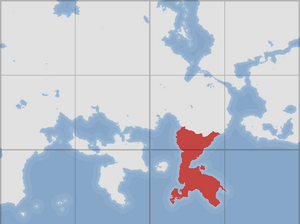Greater Tralka: Difference between revisions
No edit summary |
No edit summary |
||
| Line 132: | Line 132: | ||
Greater Tralka has a mixed social market economy, with the right to private property being guaranteed by the Tralkan Charter. However, the charter allows the Assembly of Public Policy to regulate the economy as needed through taxes, subsidies, and public spending, and economic policy has become one of the most contested topics in Tralkan politics. | Greater Tralka has a mixed social market economy, with the right to private property being guaranteed by the Tralkan Charter. However, the charter allows the Assembly of Public Policy to regulate the economy as needed through taxes, subsidies, and public spending, and economic policy has become one of the most contested topics in Tralkan politics. | ||
== Foreign Relations == | |||
Greater Tralka currently maintains good relations with most of the nations in Thrismari and throughout the world, and is a member of both the [[Thrismari Union]] and the Anterian Socialist Republics Alliance. | |||
Revision as of 16:48, 29 June 2021
This article is incomplete because it is pending further input from participants, or it is a work-in-progress by one author. Please comment on this article's talk page to share your input, comments and questions. Note: To contribute to this article, you may need to seek help from the author(s) of this page. |
The Greater Tralkan Protectorate | |
|---|---|
|
Flag | |
Motto: "In Defense of the People." | |
Anthem: "Heart of the Tralkans" | |
| Capital and largest city | Vieskov |
| Official languages | Standard Tralkan |
| Recognised regional languages | Cezskan Torovskan Voldinan |
| Demonym(s) | Tralkan |
| Government | Constitutional Stratocracy |
• Grand Marshal | Alois Pacek |
| Legislature | Assembly of Public Policy |
| Area | |
• | 217,152 km2 (83,843 sq mi) |
| Population | |
• 2021 estimate | 27,589,161 |
• 2020 census | 26,275,392 |
• Density | 121/km2 (313.4/sq mi) |
| GDP (PPP) | 2020 estimate |
• Total | $1.215 trillion |
• Per capita | $46,260 |
| GDP (nominal) | 2020 estimate |
• Total | $983.304 billion |
• Per capita | $37,423 |
| Currency | Tralkan Kroner (GTK) |
Greater Tralka is a stratocracy in southern Thrismari. It borders Lyonheimer to the north. Greater Tralka is a relatively new nation comprised of the various peoples of the Tralkans, who share a common history and similar languages.
History
Government
The government of Greater Tralka is effectively a form of constitutional stratocracy, where the military performs the functions of state at the highest levels of government, but the power of that state is bound by a charter signed by its constituent substates. This charter acts as a de facto constitution, outlining both the structure and limitations of the overarching military government, separating powers into different assemblies of senior officers, and guaranteeing many civil and human rights for the citizens of Greater Tralka.
Membership into its decision making, executive, and judicial bodies is exclusive to military officers, and is contingent on aptitude, acceptance by existing members of the respective bodies, and knowledge of the operating charter.
Greater Tralka is comprised of eight semi-autonomous regions that represent each of the signatory states of the Tralkan Charter. Domestic affairs are largely handled by these substates, which maintain local democratic governments.
Economy
Greater Tralka has a mixed social market economy, with the right to private property being guaranteed by the Tralkan Charter. However, the charter allows the Assembly of Public Policy to regulate the economy as needed through taxes, subsidies, and public spending, and economic policy has become one of the most contested topics in Tralkan politics.
Foreign Relations
Greater Tralka currently maintains good relations with most of the nations in Thrismari and throughout the world, and is a member of both the Thrismari Union and the Anterian Socialist Republics Alliance.

